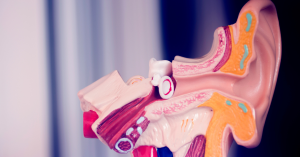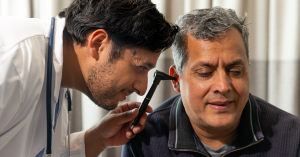If you’ve recently noticed that you can’t hear well—or at all—out of your left ear, you’re not alone. One-sided hearing loss is surprisingly common and can range from something as simple as earwax buildup to more serious conditions like nerve damage or infection. The important thing to remember is that any sudden or persistent hearing change should never be ignored.
Many people delay getting help because the issue seems isolated or minor. But in some cases, especially with sudden loss, early treatment can make a critical difference in whether your hearing returns. Understanding the potential causes and recognizing when to seek medical care are the first steps in protecting your long-term hearing health.
In this article, we’ll break down the most common reasons you might lose hearing in your left ear, the symptoms that may come along with it, and how healthcare providers determine what’s going on. You’ll also learn about available treatments and how to protect your hearing moving forward.
Common Causes of Hearing Loss in One Ear
Losing hearing in just one ear—like the left—can feel disorienting and frustrating, especially when everything else seems normal. While it might seem like an isolated problem, one-sided hearing loss can stem from several possible causes, ranging from harmless to urgent. Understanding these causes can help you decide what action to take.
1. Earwax Buildup (Impaction)
One of the most common and easily treatable causes of one-sided hearing loss is impacted earwax. When wax becomes too dense or is pushed deep into the ear canal—often by cotton swabs—it can block sound from reaching the eardrum. This can happen in just one ear, especially if you’re prone to sleeping on that side or have asymmetrical wax production.
2. Ear Infections
Infections in the middle ear (otitis media) or outer ear (otitis externa or “swimmer’s ear”) can cause sudden or gradual hearing loss on one side. These often come with symptoms like pain, redness, swelling, or fluid drainage. Left untreated, infections can worsen or lead to more serious complications.
3. Eustachian Tube Dysfunction
The Eustachian tube connects the middle ear to the back of the throat, helping equalize air pressure. Allergies, colds, sinus infections, or altitude changes can block this tube, causing a feeling of fullness, pressure, and muffled hearing in one ear. While often temporary, prolonged dysfunction may need medical attention.
4. Sudden Sensorineural Hearing Loss (SSHL)
SSHL is a rapid, unexplained hearing loss in one ear, typically occurring over a few hours or days. It affects the inner ear or the nerve pathways to the brain and is considered a medical emergency. People may notice this after waking up or during a phone call. SSHL may also be accompanied by ringing (tinnitus) or dizziness. The sooner it’s treated—usually with steroids—the better the outcome.
5. Acoustic Neuroma
A benign tumor on the auditory nerve, called an acoustic neuroma, can cause gradual or sudden hearing loss in one ear. It may also lead to tinnitus or balance problems. Though rare, this condition is diagnosed with imaging (usually MRI) and monitored or treated based on size and symptoms.
6. Trauma or Loud Noise Exposure
If you’ve recently experienced a head injury, a sudden loud sound, or extreme pressure change, it could damage structures in the inner ear and lead to one-sided hearing loss. Even activities like firing a gun without ear protection can cause immediate hearing damage on the exposed side.
7. Circulatory or Neurological Issues
Though less common, stroke, multiple sclerosis, and other neurological or vascular conditions can interfere with hearing on one side. These are more likely if your hearing loss comes with other symptoms like facial weakness, vision changes, or difficulty speaking.
Key Symptoms That May Accompany Left-Ear Hearing Loss
When you experience hearing loss in just your left ear, it’s rarely an isolated symptom. Often, your body gives other subtle (or not-so-subtle) signals that help point to the underlying issue. Recognizing these additional symptoms can help you—and your healthcare provider—narrow down the cause and determine how urgent the situation may be.
Tinnitus (Ringing in the Ear)
One of the most common accompanying symptoms is tinnitus—a ringing, buzzing, hissing, or roaring sound in the affected ear. This can be constant or come and go, and it’s frequently linked to nerve-related hearing loss, such as sudden sensorineural hearing loss (SSHL) or acoustic neuroma. Tinnitus can be annoying, but it’s also a key diagnostic clue.
Fullness or Pressure in the Ear
A feeling of pressure, fullness, or blockage is usually associated with Eustachian tube dysfunction, fluid buildup, or earwax impaction. This symptom often suggests a conductive hearing loss—meaning sound isn’t getting through to the inner ear. It’s often temporary and treatable.
Ear Pain or Discomfort
Pain in the ear typically signals infection or inflammation. A dull ache could point to a middle ear infection, while sharp pain might indicate an outer ear issue, such as swimmer’s ear. Pain may also be caused by trauma or even jaw issues (TMJ), which can refer pain to the ear area.
Dizziness or Balance Problems
If hearing loss is accompanied by dizziness, vertigo, or unsteadiness, it may suggest a problem with the inner ear or vestibular system. Conditions like Ménière’s disease, vestibular neuritis, or an acoustic neuroma can affect both hearing and balance. Sudden hearing loss plus vertigo is a red flag for urgent evaluation.
Fluid Drainage or Swelling
Visible fluid discharge from the ear or swelling around the ear canal can point to an outer ear infection, ruptured eardrum, or other inflammatory condition. In such cases, professional cleaning and medication are often required to prevent complications and restore hearing.
Gradual vs. Sudden Onset
The speed of onset is also important. Hearing loss that comes on suddenly—over hours or a couple of days—is more concerning and more likely to require urgent treatment. Gradual changes, especially with age, are still important but may not indicate an emergency.
When to Seek Medical Attention
It’s easy to assume that hearing loss in one ear—especially the left—will resolve on its own. But in many cases, delaying medical care can reduce your chances of full recovery, particularly if the cause is serious or time-sensitive. Knowing when to act is key to protecting your long-term hearing health.
Red Flags That Require Immediate Attention
If you experience any of the following along with hearing loss in your left ear, seek medical help immediately—ideally within 24 to 48 hours:
- Sudden hearing loss with no clear cause (like water or wax)
- Tinnitus that starts abruptly or worsens
- Vertigo or severe dizziness
- Facial numbness or weakness on one side
- Recent head trauma or exposure to loud noise
- Hearing loss that occurs after a viral illness or infection
These symptoms may indicate sudden sensorineural hearing loss (SSHL), an acoustic neuroma, or even a stroke or other neurological condition. SSHL in particular is considered a medical emergency, and early treatment with corticosteroids dramatically improves the chances of restoring hearing.
Situations That Warrant Prompt but Not Emergency Care
If your hearing loss developed more gradually or is accompanied by symptoms like ear pressure or mild discomfort, it’s still important to make an appointment with your:
- Primary care provider – to rule out infections, wax buildup, or sinus-related issues
- ENT (Ear, Nose, and Throat) specialist – for deeper evaluation or advanced testing
- Audiologist – for comprehensive hearing testing and management options
Even non-urgent hearing changes can affect your quality of life, safety, and communication, especially if they persist.
Why It’s Important Not to Wait
Some forms of hearing loss are reversible if caught early—but if you wait too long, you risk permanent damage. For example:
- Steroids for SSHL are most effective when given within 48 hours
- Infections left untreated can cause long-term complications
- Chronic Eustachian tube issues can lead to permanent middle ear damage
If you’re unsure whether your hearing loss is serious, it’s always better to err on the side of caution and get evaluated.
Diagnosis: What to Expect from a Hearing Evaluation
When you visit a healthcare provider for hearing loss in your left ear, the goal is to determine the cause and decide on the most appropriate treatment. A proper diagnosis involves several steps, starting with a review of your symptoms and medical history, followed by targeted tests to pinpoint the issue.
Initial Assessment and Medical History
Your provider will begin by asking key questions:
- When did the hearing loss start?
- Was it sudden or gradual?
- Have you experienced pain, pressure, dizziness, or ringing?
- Have you had recent illnesses, allergies, or noise exposure?
- Is there a history of ear problems or trauma?
These details help narrow down possible causes, such as infection, earwax, or more serious inner ear conditions.
Physical Examination of the Ear
Using an otoscope, the provider will visually inspect your ear canal and eardrum. This quick and painless check can reveal:
- Impacted earwax
- Signs of infection (redness, swelling, fluid)
- Eardrum perforation
- Foreign objects
If a physical cause is identified, treatment may begin right away.
Hearing Tests (Audiometry)
If the outer and middle ear look normal, you may be referred for a hearing test with an audiologist. Common tests include:
- Pure-tone audiometry – Measures your ability to hear different pitches and volumes.
- Speech audiometry – Assesses how well you understand spoken words.
- Tympanometry – Evaluates eardrum movement and middle ear pressure.
These tests determine the type and severity of hearing loss—whether it’s conductive (outer/middle ear) or sensorineural (inner ear or nerve-related).
Imaging Studies (When Needed)
If your symptoms suggest something more serious—like a tumor or neurological issue—your doctor may order imaging, such as:
- MRI – Best for detecting acoustic neuromas or nerve issues.
- CT scan – Useful for identifying structural problems or bone abnormalities.
These scans are not always necessary, but they play a vital role when red flags are present.
Specialist Referrals
Depending on the findings, you may be referred to:
- An ENT specialist for further diagnosis or surgical consultation
- An audiologist for hearing aid evaluations
- A neurologist if a central nervous system issue is suspected
Getting an accurate diagnosis is the first and most important step toward effective treatment and hearing preservation.
Treatment Options Based on Cause
Once the cause of your left-ear hearing loss is identified, your healthcare provider will recommend a treatment plan tailored to your specific diagnosis. Some conditions are simple to fix, while others may require more involved or ongoing care. Here’s what you can expect based on the most common causes.
Earwax Removal
If a wax impaction is blocking your left ear, treatment is typically quick and highly effective. Removal options include:
- Ear irrigation with warm water or saline
- Manual extraction using specialized tools
- Softening drops to help loosen the wax before removal
Once cleared, hearing often returns immediately.
Medication for Infections
If your hearing loss is caused by a bacterial infection, your doctor may prescribe:
- Antibiotic ear drops (for outer ear infections)
- Oral antibiotics (for middle ear infections)
- Pain relievers or anti-inflammatories to reduce discomfort
Fungal infections may require antifungal drops. Prompt treatment typically leads to a full recovery of hearing.
Decongestants and Nasal Steroids
For Eustachian tube dysfunction, especially related to allergies or sinus congestion, treatment may include:
- Decongestants (oral or nasal spray)
- Nasal corticosteroids
- Antihistamines for allergy-related inflammation
- Autoinflation techniques (like swallowing or yawning to equalize pressure)
This type of hearing loss often resolves within days to a few weeks.
Steroids for Sudden Sensorineural Hearing Loss (SSHL)
If diagnosed with SSHL, your provider will likely prescribe high-dose corticosteroids—either:
- Orally, typically for 7–14 days, or
- Via injection through the eardrum (intratympanic steroids)
Steroids reduce inflammation in the inner ear and improve the chances of recovery—especially if started within the first 48 hours.
Surgery or Monitoring for Acoustic Neuroma
For cases involving an acoustic neuroma, treatment depends on the tumor’s size and symptoms. Options include:
- Monitoring with periodic MRI scans
- Surgical removal
- Radiation therapy in select cases
Treatment decisions are typically made in consultation with an ENT specialist or neurosurgeon.
Hearing Aids and Assistive Devices
If your hearing loss turns out to be permanent, hearing aids may significantly improve your quality of life. Solutions include:
- Standard hearing aids for mild-to-moderate loss
- CROS or BiCROS hearing systems for single-sided deafness
- Bone-anchored hearing systems (BAHS) for conductive or mixed hearing loss
An audiologist can help you choose the right device based on your hearing profile and lifestyle.
Preventing Future Hearing Problems
Whether your hearing loss in the left ear was temporary or permanent, taking steps to protect your hearing going forward is essential. Hearing damage is often preventable, and with a few lifestyle changes and good habits, you can reduce the risk of further loss or complications in the future.
Protect Your Ears from Loud Noise
Prolonged or sudden exposure to loud sounds is one of the most common causes of permanent hearing loss. To keep your ears safe:
- Use earplugs or earmuffs in noisy environments (concerts, power tools, lawnmowers)
- Lower the volume on headphones or earbuds—follow the 60/60 rule: 60% volume for no more than 60 minutes at a time
- Take listening breaks when in loud places
- Be cautious around firearms or explosive sounds—use protection every time
Even a single exposure to a loud noise can cause damage to the delicate structures of the inner ear.
Manage Chronic Health Conditions
Conditions like diabetes, high blood pressure, and autoimmune diseases can affect blood flow to the ears and increase your risk of hearing loss. Keep these conditions under control by:
- Following your treatment plan
- Eating a heart-healthy diet
- Staying physically active
- Scheduling regular checkups
A healthy cardiovascular system supports healthy hearing.
Don’t Ignore Subtle Changes
Small shifts in your hearing—like needing to turn up the TV, struggling in noisy rooms, or having trouble following conversations—can be early warning signs. If you notice changes:
- Schedule a hearing evaluation with an audiologist
- Keep a journal of symptoms to track progression
- Get checked even if the symptoms affect only one ear
The earlier a problem is caught, the more treatment options are available.
Avoid Unsafe Ear Cleaning
Many cases of one-sided hearing loss are caused by improper ear cleaning, especially with cotton swabs. To clean your ears safely:
- Let earwax work its way out naturally
- Use doctor-approved ear drops if needed
- Visit a professional for safe removal if you feel blocked or full
Never insert objects into your ear canal—they can push wax deeper, cause injury, or rupture your eardrum.
Schedule Regular Hearing Tests
Especially after an episode of hearing loss in one ear, routine hearing exams are a smart preventative step. Adults over 50 should have their hearing tested every 1–2 years, or sooner if symptoms return.
Your provider can monitor your hearing health and help catch any changes before they become permanent.
Conclusion
Hearing loss in just your left ear may feel like a small inconvenience—but it can be a big signal from your body that something needs attention. From simple issues like earwax buildup to more serious conditions like sudden sensorineural hearing loss (SSHL), the range of possible causes makes it critical not to ignore the symptom.
The good news? Many causes of left-ear hearing loss are treatable, especially when diagnosed early. Whether it’s a quick fix like ear cleaning, a course of antibiotics, or prompt steroid treatment for nerve-related loss, the sooner you act, the better your chances of restoring hearing or preventing further damage.
If you’ve experienced any sudden, persistent, or unexplained hearing changes—especially in just one ear—don’t delay. Reach out to your healthcare provider or hearing specialist, and take the first step toward understanding and protecting your hearing.
FAQ
Why can’t I hear out of my left ear suddenly?
Sudden hearing loss in one ear may be caused by impacted earwax, an ear infection, or a more serious condition like sudden sensorineural hearing loss (SSHL). SSHL is a medical emergency that requires immediate treatment—ideally within 48 hours—to improve the chances of recovery. If your hearing changes suddenly, contact a healthcare provider right away.
Is it normal to have hearing loss in just one ear?
It’s not uncommon, but it’s not something to ignore. One-sided hearing loss can result from benign issues like wax buildup or fluid, but it may also signal underlying conditions such as nerve damage, acoustic neuroma, or vascular issues. A hearing evaluation can help determine the exact cause.
Can an ear infection cause hearing loss in one ear?
Yes. Middle and outer ear infections can cause temporary hearing loss in one ear, often accompanied by pain, pressure, or drainage. With appropriate treatment, such as antibiotics or ear drops, hearing usually returns once the infection clears.
Should I be worried about tinnitus in my left ear?
Tinnitus—ringing or buzzing in one ear—can be a sign of inner ear damage, hearing loss, or even a tumor like an acoustic neuroma. It’s especially concerning if it comes on suddenly or is accompanied by hearing loss or dizziness. A medical evaluation is recommended.
What kind of doctor should I see for one-sided hearing loss?
You can start with a primary care doctor, but they may refer you to an ENT (ear, nose, and throat specialist) or an audiologist. These specialists can conduct advanced testing and provide targeted treatment based on the cause of your hearing loss.






